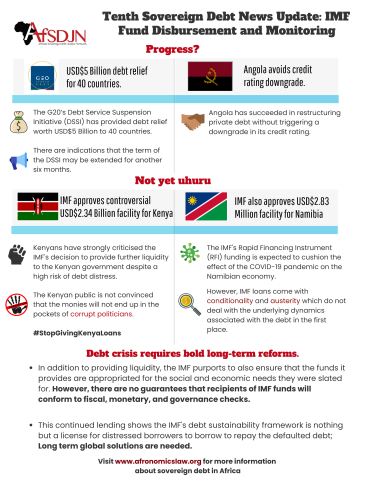
April 12, 2021
The G20’s Debt Service Suspension Initiative (DSSI) has provided debt relief worth USD$5 Billion to 40 countries. The DSSI was originally set to expire in December 2020, but after the recent meeting of the G20 Finance Ministers meeting, there are indications that the term of the DSSI may be extended for another six months.
As African countries grapple with economic shocks arising from the pandemic, the exposure of debt vulnerabilities and the dimming practicality of debt sustainability, the United Nations Economic Commission for Africa (UNECA) has identified Angola as a model African country which although at the brink of incurring debts from China and private creditors, was able to swiftly take advantage of the G20’s Debt Service Suspension Initiative (DSSI) and ultimately managed to avoid a downgrade in its credit rating.
In what is purported to be a support of the next phase of Kenya’s Covid-19 response towards the reduction of debt vulnerabilities and protection of vulnerable groups, the Executive Board of the International Monetary Fund (IMF) has approved on Friday, April 2, 2021, the Extended Credit Facility (ECF) and Extended Fund Facility (EFF) for Kenya in the value of USD$2.34 Billion. Although the IMF recognizes that Kenya is at high risk of debt distress, the IMF nevertheless consider Kenya’s debt as being sustainable. The IMF has put the cap on the debt risk at 8.7 percent and 70.4 percent of fiscal deficit to GDP and debt ratio to GDP respectively. The IMF’s debt sustainability analysis may very well be playing the perverse role of enabling Kenya to borrow to pay its prior debts. Kenyans took to social media asking the IMF not to provide any further liquidity to the Kenyan government because of corruption. The IMF’s promise that ensuring that recipients of their funds conform to its fiscal, monetary, and governance issues has not convinced the Kenyan public that the monies will not end up in the pockets of corrupt politicians.
The Executive Board of the IMF has also disbursed the sum of USD$2.83 Million to Namibia under the Rapid Financing Instrument (RFI). The funds are expected to cushion the effect of the pandemic on the economy which is seen to have contracted by 7.2 percent in 2020 and projected to remain contracted at 2.1 percent in 2021. The funds are also expected to be used for adequate response to health emergencies and purchase of vaccines.
In addition to providing liquidity, the International Monetary Fund purports to also ensure that the funds it provides are appropriated for the social and economic needs they were slated for. Recently, some staff of the IMF completed a technical virtual visit with the authorities in the government of Gambia and Mozambique respectively. The reports seemed impressive and where required the IMF officials were able to provide technical assistance in developing policy reforms.